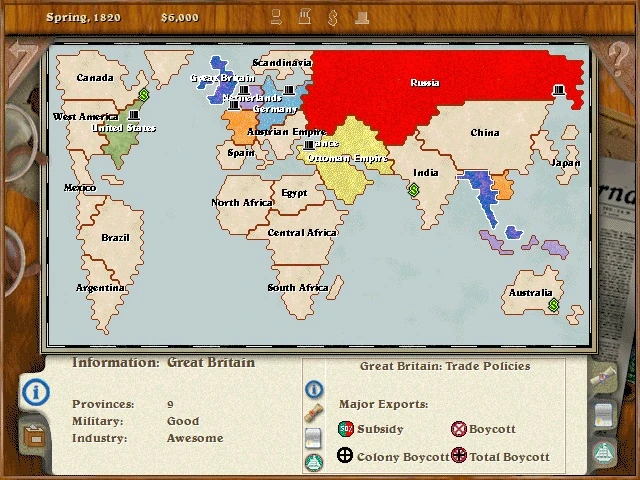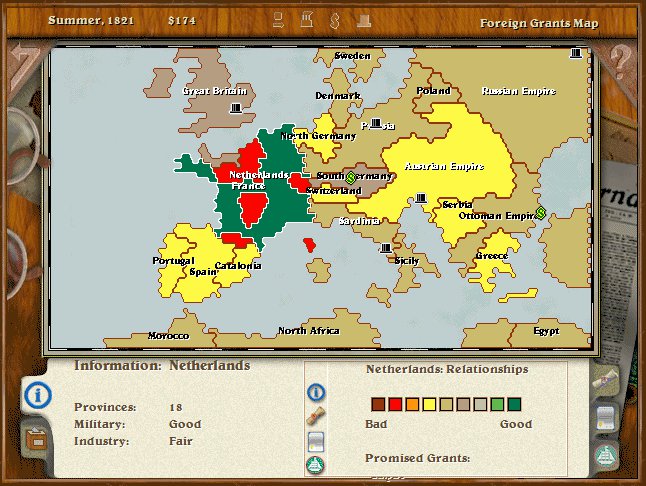Random or historical[]
There are two ways to play Imperialism: in a fictional, randomly generated world (which can be identical to what someone else found if you use a "map key"), or in a historical scenario.
Random[]
In the first case, the player selects one of seven "great powers" and starts ruling in 1815, a year considered by many historians the beginning of the 19th-century era in the real world.
Goal[]
The goal is to be voted world ruler by a two-thirds majority of the "Council of Governors", in which all provincial governors of the world convene once in a decade. Governors in "minor nations" tend to abstain in early years then vote for great powers that have favored their country in trade and diplomacy, whereas governors in great powers vote for strong military powers. If no two-thirds majority is ever reached, the game continues until the year 1915, when every governor is required to vote and the power with the largest number of governors behind it wins the game.
Score[]
Although victory is determined by the Council of Governors, the game score is determined by how much a player has built, including the size of a Great Power's military, labor force, transport network, merchant marine, diplomatic standing and number of provinces controlled.
Scenarios[]
In the historical scenarios, the player chooses a European industrial power (depending on the scenario, Great Britain, Spain, France, Netherlands, Prussia, Germany, Austria-Hungary, Sardinia, Italy, Russia and the Ottoman Empire are the commonest available). The game may start not in 1815 but in 1820 (apparently so that France isn't too weak at the start of the game), in 1848, the year of revolutions, or in 1882, at the start of the arms race that eventually led to World War I.
Goal[]
The winning of the game is still the same, except that in the 1882 scenario the Council of Governors does not convene until 1915.
Taking your turn[]
Imperialism is entirely turn-based. Each turn, players make their decisions in five screens: the map screen, where "specialists" (prospectors, engineers, etc.) are put to work, and military orders are given; the transport screen, where transport capacity is allocated; the industry screen, where production is determined and workers are recruited and trained or employed in various ways; the trade screen, where offers and bids for the next trade session are determined; and the diplomacy screen, where world information is available and diplomatic decisions are made.
When all the players click the "End turn" button, the orders are processed. Turn-based trade sessions, diplomacy sessions (the acceptance/declining of treaties) and battles follow. Battles too are turn-based, and they can be either fought by the player or left to the game AI. Naval battles are always handled by the AI.
Multiplayer; tutorials; mods[]
In multiplayer mode, at most 7 players can play together over a network. Games can be played over a LAN or the Internet. Imperialism offers a tutorial mode and five levels of game difficulty. Game editors and mods have also been published to create new scenarios, such as a world map.


Economy[]
Imperialism's economic model is a kind of mercantilism where the state controls production and engages in trade. To produce anything, you need raw materials. These can be bought on the world market, or gained by exploitation of resources in the player's country. For instance, timber can be obtained by exploiting forests. It can subsequently be transformed into lumber or paper in a lumber mill. Lumber can be used to expand internal transport, to increase factory output, or for producing merchant ships and warships. It can also be processed further into furniture, which is used to recruit new workers, but more commonly is sold on the market to produce revenue. Paper is used to train workers for higher levels of productivity, and then educate them so they can serve in more advanced military units or as civilian specialists (i.e. prospectors, engineers, miners, ranchers, farmers, foresters and oil drillers).
Often a Great Power will buy raw materials (such as timber) from a Minor Nation and sell the refined goods (furniture) back to the same or another minor nation, generating revenue as well as improving diplomatic relations. From the start of the game, Great Powers compete to be the favored trade partner of resource-rich minor nations, using trade subsidies and various forms of diplomacy.
Diplomacy[]
- Main article: Diplomacy (Imp1)
In the Imperialism diplomacy screen, various treaties can be proposed to other countries, and war can be declared on them. Also, trade subsidies may be offered. These increase the prices paid for a country's export goods, and decrease the price the other country pays for the player's exports, making trade with the subsidizer nation more profitable for the other country and thus more likely.
Opening screen[]
Room looks like upper-class 19th century. Mouse-over various objects and read about them on the carpet:
- Book: Load Scenario or Tutorial (Recovery of France 1820, Naval Competition 1882, Unification Movements 1848-1890, and seven tutorials); there may be other scenarios if your computer has them loaded
- Globe: Start New Game on Random Map
- Ship in bottle: Load Saved Game
- Pen and ink: Preferences (Sound volume, Music volume, Warnings, Minister briefings, Tactical battles)
- Trophy cabinet: Show High Scores (which may initially show Bismarck 10, Metternich 9, Morgan 8, ...)
- Telephone (which A.G.Bell would have recognized): Multiplayer (a similar room with five options)
- Doors: Quit
Other screens[]
Numerous other screens appear at various times, depending on what the player clicks and what stage a turn is at.

Netherlands armies have taken half of France without alienating too many nearby nations. Great Britain has Normandy.
Winning strategies[]
Empire building can be achieved through either diplomacy or conquest. In either case, the empire must have a solid economic grounding, which is established by exploitation of the country's resources (timber, iron, etc.), by industry (for example, turning raw materials iron and coal into steel) and by trade.
See also[]
| This page uses Creative Commons Licensed content from Wikipedia (view authors). |